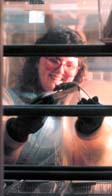 Mouse laboratory to open at UC Davis Medical Center In a move that will boost cancer research at UC Davis, the Jackson Laboratory, the world's foremost nonprofit institution for mouse-based research, is establishing a new West Coast collaboration with UC Davis which will complement the campus's mouse biology program. The Bar Harbor, Maine-based laboratory will produce and maintain genetically customized laboratory mice that will be made available to researchers at UC Davis and throughout the western United States. Mice produced at the facility will include transgenic mice that have genes inserted to produce physical traits useful in studying the genetic origins of human diseases. "Because cancer is a disease of damaged genes, genetically-manipulated mice provide functional tests of suspected human cancer genes and a platform for testing gene and drug therapies to combat cancer," says Hsing-Jien Kung, director of basic science and deputy director of the UC Davis Cancer Center. Transgenic mice let researchers develop animal models for cancer, adds Paul Gumerlock, an associate professor of hematology/oncology.
The lab's ability to "knock-out mice" - animals altered so that genes suspected of playing a role in certain diseases are mis- sing - will be especially helpful to scientists like Gumerlock, who is investigating the relationship of the p27 tumor suppressor gene and resistance to chemotherapy. The Jackson Laboratory will work jointly with the Center for Comparative Medicine, the administrative home to UC Davis' existing Mouse Biology Program. The new alliance was devel- oped in response to efforts by the National Institutes of Health to increase funding and build an infrastructure for mouse-based research.
Home |
Table of Contents |
To our Readers |
Building on Basics UC Davis Health System | © 2000, 2001, 2002 UC Regents. All rights reserved. |
John Hershey, professor of biological chemistry at UC Davis, discusses protein translational control and its connec- tion to cancer at the fifth annual cancer research symposium. More than 120 scientists from the Sacramento region attended the event, which took place at the UC Davis Cancer Center on Sept. 17-18. |
 "We
get clues about the process of oncogenesis in tissue samples, but
oncogenesis is very different in an organism than in the lab,"
says Gumerlock.
"We
get clues about the process of oncogenesis in tissue samples, but
oncogenesis is very different in an organism than in the lab,"
says Gumerlock. 
